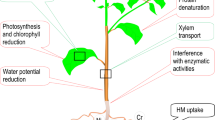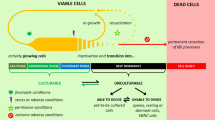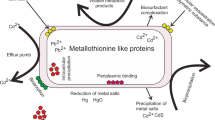Abstract
Soil pollution by lead (Pb) is a major health concern due to Pb toxicity. Phytoextraction could remove Pb, but this technique is limited by the low Pb mobility in soils. Pb mobility can be increased by bioaugmentation, which consists in adding selected bacteria in soil to increase Pb bioavailability. Nonetheless, many bioaugmentation and phytoextraction experiments have failed because bacterial selections did not take into account the presence of metals. Therefore, we developed a microplate assay with Pb-enriched growth media for the rapid selection of bacterial strains. Selection criteria included the ability of bacteria to grow in soils, to promote plant growth and to increase Pb availability. Results show that 100–250 µM Pb induced a decrease of production of indole acetic acid (IAA), a plant growth promotor, by up to 49% for Cupriavidus metallidurans, compared to the control without Pb. This finding implies that application in real soil conditions with C. metallidurans would have probably failed, thus strengthening the value of our selection method in the presence of Pb. By contrast, 100–250 µM Pb induced a 8.5–11-fold higher degradation of aminocyclopropane carboxylic acid (ACC) by C. metallidurans. Surprisingly, Pseudomonas putida did not degrade ACC without Pb, but degraded ACC at 100–250 µM Pb. This observation means that Pb activates ACC degradation, which should reduce plant stress because ACC is the precursor of the ethylene phytohormone. Overall, our selection method in the presence of Pb allows to reveal new bacterial properties, which would not have been disclosed by current methods that do not take into account the effect of metals. Our method allows also to test simultaneously about 200 bacterial isolates. In addition, our findings show for the first time that Pb changes the production of IAA and the degradation of ACC.


Similar content being viewed by others
References
Andrades-Moreno L, del Castillo I, Parra R, Doukkali B, Redondo-Gómez S, Pérez-Palacios P, Caviedes MA, Pajuelo E, Rodríguez-Llorente ID (2014) Prospecting metal-resistant plant-growth promoting rhizobacteria for rhizoremediation of metal contaminated estuaries using Spartina densiflora. Environ Sci Pollut Res 21:3713–3721. https://doi.org/10.1007/s11356-013-2364-8
Arshad M, Saleem M, Hussain S (2007) Perspectives of bacterial ACC deaminase in phytoremediation. Trends Biotechnol 25:356–362. https://doi.org/10.1016/j.tibtech.2007.05.005
Arunakumara KKIU, Walpola BC, Min-Ho Yoon MH (2015) Bioaugmentation-assisted phytoextraction of Co, Pb and Zn: an assessment with a phosphate-solubilizing bacterium isolated from metal-contaminated mines of Boryeong Area in South Korea. Biotechnol Agron Soc Environ 19(2):143–152
Bois P, Huguenot D, Norini MP, Ul Haque MF, Vuilleumier S, Lebeau T (2011) Herbicide degradation and copper complexation by bacterial mixed cultures from a vineyard stormwater basin. J Soils Sedim 11:860–873. https://doi.org/10.1007/s11368-011-0354-3
Bongers M, Rusch B, van Gestel CA (2004) The effect of counterion and percolation on the toxicity of lead for the springtail Folsomia candida in soil. Environ Toxicol Chem Int J 23:195–199. https://doi.org/10.1897/02-508
Braud A, Jezequel K, Vieille E, Tritter A, Lebeau T (2006) Changes in extractability of Cr and Pb in a polycontaminated soil after bioaugmentation with microbial producers of biosurfactants, organic acids and siderophores. Water Air Soil Pollut 6:261–279. https://doi.org/10.1007/s11267-005-9022-1
Braud A, Hubert M, Gaudin P, Lebeau T (2015) A quick rhizobacterial selection tests for the remediation of copper contaminated soils. J Appl Microbiol 119:435–445. https://doi.org/10.1111/jam.12865
Carlot M, Giacomini A, Casella S (2002) Aspects of plant-microbe interactions in heavy metal polluted soil. Acta Biotechnol 22(1–2):13–20. https://doi.org/10.1002/1521-3846(200205)22:1/2%3c13:AID-ABIO13%3e3.0.CO;2-9
Chen L, Luo S, Li X, Wan Y, Chen J, Liu C (2014) Interaction of Cd-hyperaccumulator Solanum nigrum L. and functional endophyte Pseudomonas sp. Lk9 on soil heavy metals uptake. Soil Biol Biochem 68:300–308. https://doi.org/10.1016/j.soilbio.2013.10.021
Díaz de Villegas ME, Villa P, Frías A (2002) Evaluation of the siderophores production by Pseudomonas aeruginosa PSS. Rev Latinoam Microbiol 44:112–117
Dworkin M, Foster JW (1958) Experiments with some microorganisms which utilize ethane and hydrogen. J Bacteriol 75:592–603
Grobelak A, Napora A, Kacprzak M (2015) Using plant growth-promoting rhizobacteria (PGPR) to improve plant growth. Ecol Eng 84:22–28. https://doi.org/10.1016/j.ecoleng.2015.07.019
Grobelak A, Kokot P, Hutchison D, Grosser A, Kacprzak M (2018) Plant growth-promoting rhizobacteria as an alternative to mineral fertilizers in assisted bioremediation—sustainable land and waste management. J Environ Manage 227:1–9. https://doi.org/10.1016/j.jenvman.2018.08.075
Gupta P, Kumar V, Usmani Z, Rani R, Chandra A, Gupta VK (2019) A comparative evaluation towards the potential of Klebsiella sp. and Enterobacter sp. in plant growth promotion, oxidative stress tolerance and chromium uptake in Helianthus annuus L. J Hazardous Mater 377:391–398. https://doi.org/10.1016/j.jhazmat.2019.05.054
Khan MS, Zaidi A, Wani PA, Oves M (2009) Role of plant growth promoting rhizobacteria in the remediation of metal contaminated soils. Environ Chem Lett 7:1–19. https://doi.org/10.1007/s10311-008-0155-0
Kumar SLR (2019) Exploration of heavy metal resistant rhizobacteria Enterobacter cloacae PC3 to enhance growth and metal remediation potential of Zea mays L. under Cd and Pb stress. J Emerg Technol Innov Res 6:576–587
Lebeau T (2011) Bioaugmentation for in situ soil remediation: how to ensure the success of such a process. In: Singh A, Parmar N, Kuhad RC (eds) Bioaugmentation, biostimulation and biocontrol. Soil biology, vol 28. Springer, Berlin, pp 129–186
Lebeau T, Braud A, Jézéquel K (2008) Performance of bioaugmentation-assisted phytoextraction applied to metal contaminated soils: a review. Environ Pollut 153:497–522. https://doi.org/10.1016/j.envpol.2007.09.015
Liebeke M, Brozel VS, Hecker M, Lalk M (2009) Chemical characterization of soil extract as growth media for the ecophysiological study of bacteria. Appl Microbiol Biotechnol 83:161–173
Lindsay WL, Norwell WA (1978) Development of a DTPA soil test for zinc, iron, manganese, and copper. Soil Sci Soc Am J 42:421–428. https://doi.org/10.1007/s00253-009-1965-0
Ma Y, Rajkumar M, Rocha I, Oliveira RS, Freitas H (2015) Serpentine bacteria influence metal translocation and bioconcentration of Brassica juncea and Ricinus communis grown in multi-metal polluted soils. Front Plant Sci Plant Biotechnology 5:757. https://doi.org/10.3389/fpls.2014.00757
Ma Y, Zhang C, Oliveira RS, Freitas H, Luo Y (2016) Bioaugmentation with Endophytic Bacterium E6S Homologous to Achromobacter piechaudii Enhances Metal Rhizoaccumulation in Host Sedum plumbizincicola. Front Plant Sci 7:75. https://doi.org/10.3389/fpls.2016.00075
Mesa J, Rodríguez-Llorente ID, Pajuelo E, Piedras JM, Caviedes MA, Redondo-Gómez S et al (2015) Moving closer towards restoration of contaminated estuaries: bioaugmentation with autochthonous rhizobacteria improves metal rhizoaccumulation in native Spartina maritima. J Hazard Mater 300:263–271. https://doi.org/10.1016/j.jhazmat.2015.07.006
Nautiyal CS (1999) An efficient microbiological growth medium for screening solubilizing microorganisms. FEMS Microbiol Lett 170:265–270. https://doi.org/10.1111/j.1574-6968.1999.tb13383.x
Patten CL, Glick BR (2002) Role of Pseudomonas putida indole acetic acid in development of host plant root system. Appl Environ Micobiol 68:3795–3801. https://doi.org/10.1128/AEM.68.8.3795-3801.2002
Płociniczak T, Chodór M, Pacwa-Płociniczak M, Piotrowska-Seget Z (2018) Metal-tolerant endophytic bacteria associated with Silene vulgaris support the Cd and Zn phytoextraction in non-host plants. Chemosphere 219:250–260. https://doi.org/10.1016/j.chemosphere.2018.12.018
Rajkumar M, Ae N, Freitas H (2009) Endophytic bacteria and their potential to enhance heavy metal phytoextraction. Chemosphere 77:153–160. https://doi.org/10.1016/j.chemosphere.2009.06.047
Rizvi A, Khan MS (2017) Cellular damage, plant growth promoting activity and chromium reducing ability of metal tolerant Pseudomonas aeruginosa CPSB1 recovered from metal polluted Chilli (Capsicum annuum) rhizosphere. Acta Sci Agric 1:36–46
Sauvé S, McBride M, Hendershot W (1998) Lead phosphate solubility in water and soil suspensions. Environ Sci Technol 32:388–398. https://doi.org/10.1021/es970245k
Schwyn B, Neilands JB (1987) Universal chemical assay for the detection and determination of siderophores. Anal Biochem 160:47–56. https://doi.org/10.1016/0003-2697(87)90612-9
Sessitsch A, Kuffner M, Kidd P, Vangronsveld J, Wenzel WW, Fallmanna K, Puschenreiter M (2013) The role of plant-associated bacteria in the mobilization and phytoextraction of trace elements in contaminated soils. Soil Biol Biochem 60:182–194. https://doi.org/10.1016/j.soilbio.2013.01.012
Shahid M, Pinelli E, Dumat C (2012) Review of Pb availability and toxicity to plants in relation with metal speciation; role of synthetic and natural organic ligands. J Hazard Mater 219:1–12. https://doi.org/10.1016/j.jhazmat.2012.01.060
van der Ent A, Baker AJM, Reeves RD, Pollard AJ, Schat H (2013) Hyperaccumulators of metal and metalloid trace elements: facts and fiction. Plant Soil 362:319–334. https://doi.org/10.1007/s11104-012-1287-3
van der Lelie D, Corbisier P, Diels L, Gilis A, Lodewyckx C, Mergeay M, Taghavi S, Spelmans N et al (2000) The role of bacteria in the phytoremediation of heavy metals. In: Terry N, Banuelos G (eds) Phytoremediation of contaminated soil and water. Lewis Publisher, Boca Raton, pp 265–281
Weyens N, Gielen M, Beckers B, Boulet J, van der Lelie D, Taghavi S, Carleer R, Vangronsveld J (2014) Bacteria associated with yellow lupine grown on a metal-contaminated soil: in vitro screening and in vivo evaluation for their potential to enhance Cd phytoextraction. Plant Biol 16:988–996. https://doi.org/10.1111/plb.12141
Yahaghi Z, Shirvani M, Nourbakhsh F, Coba de la Peña T, Pueyo JJ, Talebi M (2018) Isolation and characterization of Pb-solubilizing bacteria and their effects on Pb uptake by Brassica juncea: implications for microbe-assisted phytoremediation. J Microbiol Biotechnol 28(7):1156–1167. https://doi.org/10.4014/jmb.1712.12038
Acknowledgements
This work was financed by France’s Pays de la Loire Regional Council (under the POLLUSOLS-OSUNA Project). We thank Dr. Armelle Braud for her assistance in the implementation of the tests.
Author information
Authors and Affiliations
Corresponding author
Additional information
Publisher's Note
Springer Nature remains neutral with regard to jurisdictional claims in published maps and institutional affiliations.
Electronic supplementary material
Below is the link to the electronic supplementary material.
Rights and permissions
About this article
Cite this article
Bouquet, D., Lépinay, A., Gaudin, P. et al. A new assay of bacterial selection with Pb reveals an unexpected effect of Pb on bacterial behavior: implications for remediation. Environ Chem Lett 18, 983–992 (2020). https://doi.org/10.1007/s10311-020-00986-y
Received:
Accepted:
Published:
Issue Date:
DOI: https://doi.org/10.1007/s10311-020-00986-y




